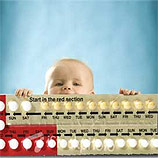We answer the most frequently asked questions about birth-control that come up on the Contraception Forum.
Q: Where can I get birth control, and do I need a prescription?
A: Hormonal methods such as the pill, injection, or placement of implants/rings will require a visit to the doctor for a prescription. Alternatively you can also visit a clinic where the pill and hormonal injections are both available free of charge. The birth-control patch is available at pharmacies; you will need a prescription from your doctor.
Q: Is it normal to miss periods after quitting contraception?
A: Commonly, after stopping the oral contraceptive, there is a period of time which the body needs to adjust to its own cycle again. In this time, periods may be irregular or may not come at all. It often takes three months for the cycle to regularise. Most women do not fall pregnant during this time, though there are, of course, instances where pregnancy does occur. If you have a delayed period soon after stopping the Pill, it is probably a good idea to do a pregnancy test so as to know where you stand. Bear in mind, however, that it is more likely to be due to a readjustment of the hormones. If this persists beyond three months, a gynaecological check-up would be advisable.
Q: How long will it take for me to fall pregnant if I stop using the Pill?
A: A normal healthy couple who have never been on contraception can take up to a year to conceive. The reason for this is that conception does not result from every episode of intercourse, even if it occurs at the time of ovulation. There are many reasons for this. For example, the sperm which reaches the egg first may not be able to fertilise it, the egg may fertilise but not implant, the fertilised egg may abort very early, often because of a genetic abnormality. If you have been on the Pill, after the three months adjustment time, your chances would be the same as that of someone who has never been on contraception. If you have used the injections, it could take up to a year for your periods to return. From the time that you have regular periods again, it may still take up to a year to conceive, the same as any other couple not using any contraception.
Q: How does the birth-control patch work?
A: The birth-control patch contains two hormones: oestrogen and progestin. Once the patch is applied to the skin it releases a steady stream of oestrogen and progestin for a week which prevents the ovaries from releasing an egg (ovulation). It also thickens the mucous from the cervix, making it difficult for sperm to reach the egg, and makes the lining of the womb thinner which prevents the implantation of a fertilised egg. The patch can be worn on the arm, buttocks, torso or abdomen. The patch is worn for a week at a time, and changed on the same day for three consecutive weeks. The fourth week is patch free.
Q: I have been on the Evra patch for about 12 months now. I want to take a 3 month break. What side effects may I expect? What days of my ovulation cycle are the ''high pregnancy'' days?
A: You may have side effects such as breast tenderness, mood swings, bloating for the first month after stopping the patch. Your period may take a month or two stabilise so it will be difficult to work out when you are ovulating.
Q: I've recently started with the Evra contraceptive patch. I'm now on my second week after my period with my second patch, but haven't really 'stopped'. This is worrying me. Is it supposed to be like this, and is the Evra safe in terms of health risks?
A: It may take a month or two for your body to adjust to the patch.
Q: I have been on the patch for a year now. Every now and then I spot between periods. However, I have now been spotting for two weeks. Is this normal?
A: It sounds like breakthrough bleeding, but you should also have a gynae check to exclude any other problems.
Q: I am on the injection: how soon after I've started it, and for how long, is it effective?
A: After 24 hours a single injection provides contraceptive protection either for 12 weeks (Depo- Provera®, Petogen®) or for 8 weeks (Nur-Isterate®).
Q: Why has my libido decreased since I've been on the Pill?
A: There is a link between the oral contraceptive and the effect that the medication has on a woman's sex drive. It is know that the Pill decreases the amount of testosterone in a woman's body. This hormone causes an increase in blood flow to the woman's sexual organs and heightens her arousal.
Q:What are the side effects of birth control pills
A: Common side effects include: breast tenderness due to fluid retention, nausea, vaginal candida infection, pigmentation in the face, acne or oily skin, weight gain, headache and loss of libido. These side effects often improve or completely disappear after using the Pill for a few months.
Q: Can I fall pregnant while I'm on the Pill?
A: The Pill is highly effective if taken consistently, preferably at the same time each day. If a pill is missed or vomiting occurs soon after taking a pill, another form of contraception should be used until the onset of the next menstrual period. Certain drugs may cause the pill to become less effective, such as antibiotics. This is the reason why a doctor needs to be consulted for the prescription.
(Health24, updated July 2010)
Read more:
Contraception




 Publications
Publications
 Partners
Partners











